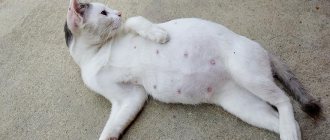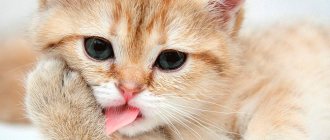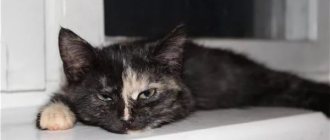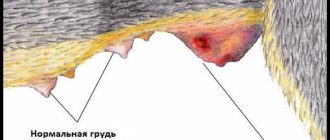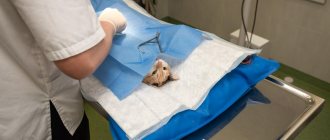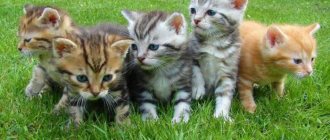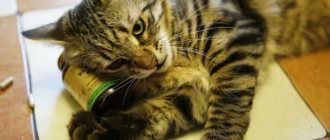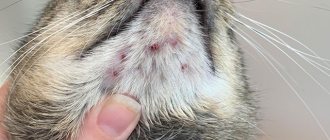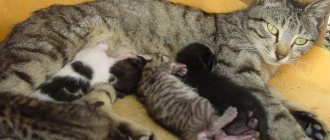Caring for the health of a domestic cat lies on the shoulders of its owners. Their task is to carefully monitor the pet’s condition, especially if it has recently experienced stress such as childbirth. Is it normal for a cat to go on a spree after giving birth, or does this indicate problems in her body?
After a cat has given birth to kittens, many owners believe that she will not ask for a cat for a long time. In fact, in nature, cats are ready to give birth again literally 1-2 months after giving birth. It is after this period of time that they go into heat.
However, you shouldn’t be surprised if the cat went on a spree much earlier. Sometimes she may go into heat literally a week after giving birth. This is a rather serious malfunction in the body. Usually it is provoked by the owners themselves when they give the cat the wrong food. Excessively high-calorie and plentiful food, which is complemented by warmth, is a signal to the cat’s body that it can again bear offspring. Also, sometimes such disruptions in the body cause cat diseases.
In this case, you have two options:
• isolate the animal from cats;
Some veterinarians claim that it is impossible to sterilize a cat while feeding. They are partly right. Developed mammary glands can complicate the operation, and the cat will take several days to recover. At this time, the kittens will be left without a mother. It is much better to simply isolate the animal and wait until it stops nursing offspring. Immediately after this, it is recommended to take the cat for sterilization.
If you do not have this opportunity, you will still have to perform the operation right away. Don't worry: after the cat recovers from surgery, her milk will return. However, you will have to feed the kittens yourself for several days.
To support the full functioning of your babies, make a warm nest for them and choose the right food. Regular cow's milk in its pure form is not suitable. You can buy powdered cat milk replacer at the veterinary store or prepare your own formula for feeding. To do this, dissolve 1 egg yolk and 4 tbsp in 0.5 liters of cow's milk. l. Sahara. Heat the mixture to a temperature of 38ºC and feed the babies using a pipette.
If you have any questions regarding sterilization of your animal, be sure to consult your veterinarian. Remember that sterilization is a procedure that can prolong the life of your pet and protect its health from very serious diseases.
A certain number of cat owners are interested in the following question: can their pet become pregnant while nursing kittens or not? It is believed that at this time a new conception is excluded. But is it?
A cat can become pregnant while nursing - that's a fact!
The kittens have already grown up, a nursing cat can already begin to flock to new ones!
This opinion is due to the fact that prolactin, which is a stimulator of milk production, blocks the production of those hormones that are responsible for ovulation.
As for representatives of the cat family, this rule almost does not work, since during sexual intercourse they may ovulate. Thus, estrus and, as a consequence, pregnancy can also occur in a nursing “lady”.
This circumstance must be taken into account and the “mother cat” must be protected from mating immediately after giving birth, that is, the male must be driven away. Similarly, it was necessary to drive away the male during pregnancy.
A rehabilitation period is necessary for an animal that has just given birth. Otherwise, there may be negative consequences for her fragile body .
When can a nursing cat start “walking”?
We need even more kittens. Let’s finish feeding and go “cat walking”!
This is of great interest to the owners of creatures called cats. According to statistics, a furry pet may be ready for a “sexual date” a couple of months after giving birth.
This is a normal pause for those females whose hormones are fine. It must be taken into account that each individual is individual.
If there is a failure in the hormonal system, the consequence will be an increase in the animal’s sexual desire immediately after birth. This will cause the owner a lot of trouble, since the pet:
- will begin to forget that she should take care, first of all, of the kittens;
- will not show appetite;
- will feed the babies less, as the volume of milk produced will decrease;
- will begin to look for ways to escape from the premises;
- will demonstrate signs of sexual desire more actively.
The owner of the “unlucky mother” will have to take on additional responsibilities:
- observe the complex behavior of the female;
- do not allow the cat to appear near her;
- take care of and feed baby kittens (if they don’t have enough mother’s milk).
What to do if a nursing cat asks for a cat?
If a nursing cat asks for a cat, you need to give a herbal-based sedative
As soon as a nursing cat begins to walk after giving birth, something urgently needs to be done to reduce the animal’s expression of sexual desire. It is advisable to purchase plant-based sedatives .
These tablets should not be given to a nursing cat.
Hormonal drugs such as “ Stop-barrier” and “Contra-sex” should not be given to cats during the feeding period . The use of hormones against the background of their own actions can provoke the appearance of cancer.
Folk remedies for solving the problem
Each cat has its own approach, and if the owner knows his pet well enough, then, accordingly, he can try to distract her from his desires. On the Internet more than once I have come across various methods of combating pet roaming, here are some of them:
Using a spray bottle
Some owners try to divert the individual's attention to themselves through regular irrigation with water. So, it is possible to distract her from her natural needs for copulation for a while
Good for evening and night time. The owner has two or three hours, or maybe all four, to sleep off.
Using a bowl of cool water. The back of the body is dipped into water, after which the “inflamed area” cools a little and the desire disappears for a while.
Physical exercise. Active games are used to switch attention. The most effective toys for cats are teasers and laser pointers.
In any case, if the cat has gone on a spree, folk remedies will only give a temporary short-term effect, which will be unreliable and short-lived. The optimal procedure is castration.
Intervals between the birth of kittens and feeding
Veterinarians recommend an interval of at least 4 months between the birth of kittens and their feeding
There is no definite opinion on what the number of births a cat should have. For owners of purebred cats (including Scottish Folds), veterinarians recommend sticking to no more than 3 lambings in 2 years . It is necessary that the interval between the birth of kittens and their feeding be at least 4 months . If the pause is longer, even better. It will allow the cat to restore its health after the period of pregnancy, childbirth and feeding. The body (when fully recovered) will be able to get stronger before the upcoming next birth.
If the owner does not have the goal of breeding kittens on a professional level, it is wiser to sterilize the animal, since each birth process greatly depletes the female’s body.
When there are contraindications to sterilization, veterinarians prescribe hormonal abortion.
People who own cats should be aware that after giving birth the cat may go into heat. If you follow the deadlines for the period intended for rehabilitation, this will not only help preserve the health of the feline representative, but also wait for full-fledged offspring in the form of healthy kittens.
Thus, the conclusion is this: a nursing cat can become pregnant (sometimes even from a castrated cat) , and the owners need to draw certain conclusions: allow pregnancy or prevent it.
Tell me, is it possible to give drugs like anti-sex to a nursing cat? The cat gave birth 3 weeks ago. Now she has gone on a spree and abandons the kitten for 3-4 days. The cat and the kitten are homeless, they live in the store, you can’t lock a cat in the store - it will make everything dirty. What to do?
Woman.ru experts
Find out the opinion of an expert on your topic
Natalya Maratovna Rozhnova
Psychologist. Specialist from the site b17.ru
Yana Vyacheslavovna Rom
Psychologist, Family consultant. Specialist from the site b17.ru
Pivneva Natalya Sergeevna
Psychologist. Specialist from the site b17.ru
Elena Mashitskaya
Psychologist. Specialist from the site b17.ru
Kostyuzhev Artyom Sergeevich
Psychotherapist, Sexologist. Specialist from the site b17.ru
Lebedeva Elena Vladislavovna
Psychologist. Specialist from the site b17.ru
Elena Evgenievna Ryabova
Psychologist, Online psychologist. Specialist from the site b17.ru
Natalia Andrushko
Psychologist, Eco-facilitator, Supervisor, Mediator. Specialist from the site b17.ru
Tankova Oksana Vladimirovna
Psychologist, Online consultant. Specialist from the site b17.ru
Natalya Evgenievna Pokhodilova
Psychologist, Kinesiologist Online consultant. Specialist from the site b17.ru
In this case, it is better to sterilize the cat. Mine also abandoned kittens and the hormones never returned to normal. The cat stopped feeding the kittens and stopped eating herself. she only asked for a cat and didn’t need anything else. When only the skin and bones of the cat became visible and we ourselves were tired of feeding the kittens from a pipette, the cat was sterilized. after a couple of days everything returned to normal.
feed the kitten with a syringe yourself, we did it that way
u nas exactly takaya ge situaciya bila, nedelei cherez 2 posle rodov koshka zagulyala, i ne kormila kotenochka(( mi ee sterelizovali))) pravda viyasnilos chto ona u nas uge beremennaya bila((( vot takie vot oni bystrye)))
Damn, you would know how annoying and amazing such denseness is. Do you know that such drugs lead to cancer? It is better to kill immediately, but do not subject the animal to a long and painful death. Why not just take it and sterilize it? I don't know what city you are in. In St. Petersburg it will cost 500 rubles, for example. If you are from St. Petersburg, go to the website www.hvosty.ru This is a website for helping homeless animals. Even if you are not from St. Petersburg, you can register and ask for advice there, but certainly not here. Find out more detailed information, as well as tips on adopting kittens and cats.
Even a single dose of this type of medication increases the likelihood of developing cancer many times over. Would you accept this yourself?
Thanks everyone for the answers. While the topic was coming out, I already took the kitten from the store to my home, I will feed it and give it a home, because we already have a lot of animals. Guest-4, I understand everything perfectly, but I will not sterilize this cat, because in addition to the fact that you need to pay for the operation, you also need to take care of the cat during the postoperative period, and in my opinion, let the cat go back outside after all this , much worse. I already have animals at home, I won’t take a cat into my family. I can still temporarily shelter a kitten and then give it a home. And it’s unlikely that anyone will need an adult semi-wild cat. And, by the way, in Moscow, a cat sterilization operation costs around 2,500 rubles.
Related topics
in some clinics you can leave a cat for a period of recovery; we sterilized a stray cat in Kiev, an operation - about 30 euros (300 hryvnia) + then I kept her for 9 days until the stitches were removed, I couldn’t take her home completely - I couldn’t take my 3 souls, and the cat was semi-wild, now lives in the yard, we constantly feed
We found the kittens in the bushes. First we fed them with a syringe, and then we found a nursing cat. She fed them, and then we noticed that she didn’t eat the food we put nearby and didn’t feed the kittens. We went to look for her and fired her for going on a spree .Will she return to the kittens?
The cat went on a spree a week after the kittens were born, what should I do?
Even a single dose of this type of medication increases the likelihood of developing cancer many times over. Would you accept this yourself?
Moderator, please note that the text contains:
The complaint has been sent to the moderator
The page will close automatically after 5 seconds
New in three days
Popular in three days
The user of the Woman.ru website understands and accepts that he is fully responsible for all materials partially or fully published by him using the Woman.ru service. The user of the Woman.ru website guarantees that the placement of materials submitted by him does not violate the rights of third parties (including, but not limited to copyrights), and does not damage their honor and dignity. The user of the Woman.ru site, by sending materials, is thereby interested in their publication on the site and expresses his consent to their further use by the editors of the Woman.ru site.
Use and reprinting of printed materials from the woman.ru website is possible only with an active link to the resource. The use of photographic materials is permitted only with the written consent of the site administration.
Posting intellectual property objects (photos, videos, literary works, trademarks, etc.) on the woman.ru website is permitted only to persons who have all the necessary rights for such posting.
Copyright (c) 2016-2019 Hirst Shkulev Publishing LLC
Online publication “WOMAN.RU” (Zhenshchina.RU)
Certificate of registration of mass media EL No. FS77-65950, issued by the Federal Service for Supervision of Communications, Information Technologies and Mass Communications (Roskomnadzor) on June 10, 2016. 16+
Founder: Limited Liability Company "Hirst Shkulev Publishing"
After the birth of kittens from their beloved pet, owners often think about when a cat can become pregnant after giving birth. Experienced breeders know that after the next lambing there must be a rehabilitation period, during which the animal will regain strength, get stronger after pregnancy and childbirth, and feed and raise its offspring. It is useful for every owner of a furry beauty to have such information.
Read in this article
conclusions
People who own cats should be aware that after giving birth the cat may go into heat. If you follow the deadlines for the period intended for rehabilitation, this will not only help preserve the health of the feline representative, but also wait for full-fledged offspring in the form of healthy kittens.
Thus, the conclusion is this: a nursing cat can become pregnant (sometimes even from a castrated cat) , and the owners need to draw certain conclusions: allow pregnancy or prevent it.
Restoring reproductive health
Pregnancy, subsequent births, care and feeding of kittens do not have the best effect on the cat’s condition. Even in case of good health, she needs time for rehabilitation and restoration of reproductive function.
Curvature of the spine in a cat
The birth of kittens requires significant energy expenditure from the female. Many animals lose weight after giving birth. The formation of embryos, the growth of fetuses, subsequent childbirth and milk feeding lead to the fact that the mother’s body suffers large losses of vitamins and minerals. A characteristic feature of the reproductive period is a deficiency of minerals such as calcium, phosphorus, and magnesium. Often, after the next lambing, a deficiency of mineral substances leads to a change in the skeleton of the pet - deflections of the back are formed, the spine is bent.
Pregnancy and childbirth do not have the best effect on a cat's reproductive health. The animal's body experiences constant hormonal changes. During estrus, estrogens are produced, which stimulate follicle growth and ovulation of eggs. When pregnancy occurs, the female’s body is influenced by the hormone progesterone, which is responsible for the implantation of embryos in the uterus and the normal course of pregnancy. Childbirth is characterized by a sharp increase in the level of oxytocin, which is responsible for contracting the smooth muscles of the uterus and preparing the mammary gland for feeding the offspring. And during feeding, the hormone prolactin is produced.
Such transformations in the body over a short period of time exhaust the animal and can lead to the development of hormonal imbalances. Therefore, a recovery period is required after the next lambing. Experienced owners know that when a cat begins to ask for a cat after giving birth, it is necessary to take measures to prevent pregnancy. The animal must be given sexual rest and measures must be taken to restore strength and health.
Much attention should be paid to mineral nutrition. The animal's diet during the rehabilitation period should contain increased amounts of calcium, phosphorus, and magnesium. For better absorption of minerals, vitamin supplements should be introduced, especially vitamin D, without which calcium is practically not absorbed into the body. When feeding your pet natural food, you should increase the proportion of dairy products, which are sources of calcium for the body.
A veterinarian will help you select the most effective drug based on a clinical examination of the animal and a biochemical blood test.
Possibility of pregnancy while breastfeeding
Many owners want to know if a cat can become pregnant while nursing kittens. There is an opinion that during this period a new conception is impossible. This point of view is due to the fact that prolactin, which stimulates milk production, blocks the production of hormones responsible for ovulation. However, this rule practically does not apply to cats, since they ovulate during sexual intercourse. Consequently, estrus and subsequent pregnancy can occur in a nursing cat. This should be taken into account and in no case should you allow mating of a pet that has just given birth. The absence of a rehabilitation period between births will negatively affect the health of the female.
Animal owners are often interested in the question of when, after lambing, a cat begins to walk. The average pet can come into heat 1 - 2 months after giving birth. This interval is typical for females with normal levels of sex hormones. However, often due to individual characteristics and hormonal imbalances, an animal can begin to walk almost immediately after birth.
This brings owners a lot of trouble. The female stops caring for her offspring, eats poorly, does not have enough milk, and the babies often remain hungry. The animal “forgets” about the kittens, tries to escape from the room, and shows all the signs of sexual heat. The owner not only has to keep an eye on the pet, not allowing the cat near it, but also takes on the care and feeding of kittens abandoned by their mother.
Therefore, when a cat begins to walk after giving birth, the owner needs to take measures to reduce the manifestation of sexual behavior. For this purpose, sedatives based on plant materials are suitable.
Has the cat gone on a spree or not?
First, you need to understand what is happening to the pet. Cats are independent animals, it’s not for nothing that people say: “A cat walks on its own!” They love their owners and are devoted to them, but at the same time they always keep their distance. People have to be extremely attentive to their pets.
Less than a year after birth, cats become sexually mature and begin to walk.
Now they are able to mate. We must remember that males are ready to meet a female at any time. Is your pet acting strange? Some signs that a cat has gone on a spree:
- the animal behaves aggressively towards its owners and other pets;
- the cat marks the territory;
- obsessive desire to leave the house, take a walk;
- screams inviting a female;
- frequent urination.
shutterstock
If the cat has gone on a spree for the first time, it is advisable to contact a veterinarian. A competent specialist will tell you how to behave in this situation, and most importantly, how to calm the cat. Professional advice and guidance is always needed. After all, we are talking about a living being. Any mistake can harm the pet and add problems and troubles to the owners.
How often can a cat give birth?
There is no consensus among owners of furry beauties about how often a cat needs to give birth. Some believe that 2 lambings per year is optimal. Veterinary specialists and responsible breeders believe that such a regime exhausts the animal, leads to a deterioration in the general and reproductive health of the female, a decrease in the animal’s life expectancy and the birth of weak young animals.
The most optimal birth frequency for purebred pets should be considered 3 lambings in 2 years, maximum once a year. With this regimen, the rehabilitation period between birth and feeding of kittens ranges from 4 to 6 months. During this period, the animal will be able to recover from previous pregnancy, childbirth and feeding, and prepare for the birth of the next healthy offspring.
In addition, breeders who professionally breed animals recommend stopping breeding females over 7 years old. After this age limit, the risks of complications for the mother increase and the likelihood of the birth of non-viable offspring arises.
What to do if the kittens are small and the cat is pregnant again?
Knowing how long it takes for a cat to become pregnant after giving birth, many owners nevertheless find themselves faced with the unpleasant fact that a nursing cat is expecting another offspring. This situation most often arises if she had access to the street or if there is an unsterilized cat in the house. You can solve the problem in the following ways:
- Sterilize the animal. If a cat does not have breeding value, it is wiser not to produce outbred offspring and not to exhaust the pet’s body with endless childbirth.
- Hormonal abortion. It is used by veterinary specialists in cases where there are contraindications to sterilization. In this case, different hormonal drugs are used depending on the stage of pregnancy.
The owner of a furry beauty should have an idea that a nursing cat can also come into heat. The task of a responsible breeder and simply a caring owner is to prevent the animal from becoming pregnant immediately after birth. Compliance with the terms of the rehabilitation period for a purebred cat will help maintain health and produce full-fledged young animals.
Types of contraception for cats. Cats are the most prolific pets. In a year, a female can become pregnant up to 6 times, giving birth to 7 - 8 kittens. . When can a cat become pregnant after giving birth?
When can a cat become pregnant after giving birth? How to find a missing cat if it is lost on the street. Marina (content manager).
After mating a pet, the owner wants to know how long pregnancy lasts in cats. . 2 - 3 weeks before giving birth, the nesting instinct awakens in a domestic cat.
Prevention of such unwanted behavior in cats
Estrus is a natural physiological phenomenon that can be prevented in only one way: castration or sterilization. This method is very popular, effective, and gives good results. If heart-rending screams are not for you, think about it in advance. It’s better to castrate cats before their first “binge,” but female cats – later, after allowing the body to form. The approach has its drawbacks: many are put off by the high cost and unsafety of the procedure - but it will save you from sleepless nights.
Now you know how to determine that a cat has gone on a spree, how to help it, and whether it is possible to prevent an undesirable phenomenon. In any case, only the owner decides the future fate - you have a choice: whether to let the pet feel happy or exclude this possibility by interrupting possible estrus in the bud. But the main thing at this time is to show care and love so that the cat feels support and your warmth.
the cat went on a spree 2 months after giving birth
COVINAN, 20 ml
Not a bad drug. I am currently injecting it into my cat for temporary contraception before sterilization. The first injection was enough for 10 months. Then she missed it and the cat went on a spree and gave birth to kittens. After 4 months She's lambed again! After the second birth, 42 days later, she was injected with Covinan again. In 2-3 months I want to have her spayed - I don’t want any more of her sprees and kittens. In the meantime, Covinan helps out))) In our state veterinary clinic, an injection costs from 200-250 rubles. for a cat. Sterilization - from 1200 rub. (to the cat).
Nursing cat.
Actually, if she goes into heat 2 weeks after giving birth, this is quite common, but not the most “correct” phenomenon; she may have some hormonal imbalance.
As a rule, milk, even from a newly pregnant cat, does not disappear, but it is very bad for the cat herself and the kittens she bears again (well, think about how much effort/energy goes into producing milk, “forming” new kittens, etc.) obviously the body wears out, and then sores may appear and new kittens may be weak, etc.
And as for feeding yourself, it’s not at all easy: you won’t be able to find a replacement for mother’s milk in the house. conditions, and antibodies that save small ones sucking mother’s milk are generally a unique thing and irreplaceable.
So, better take care of your cat, feed her now intensively (for example, give her dry food for the entire lactation period + vitamins; if she tolerates it well, let her drink lactose-free milk)
If the cat “knocked up” again, then after 4 weeks, transfer the kittens to drying or natural food and gradually separate them from the cat (for example, let them suckle only 2 times a day, then 1 time). so that she has at least some strength left to bear and feed new kittens
Thanks for the answer. Castration alone is not an option. After it, all sorts of hormonal changes begin. I don't leave kittens. Pros
Source
Did your cat go on a spree for the first time? what to do?
Please advise: Should I be patient and give her the opportunity to go through this period on her own, or should I “help” her and give her calming drops?
If a cat is valuable to you, not only as a piece of furniture, then it’s better to give it a walk. I have two cats (more precisely, one has already left for the happy world of “Whiskas”), and I can say for sure that any violence against a cat’s psychology changes its character, and far from for the better. We tried with our first cat. They gave me medicine, on the advice of one grandmother, they soaked me in cold water, and in the end they operated on me. You know, it turned out to be a different cat. Of course we didn't throw it away. She lived with us all her cat life, but she never became our friend. But the second one. And he will take a walk, and give birth (we always place kittens), and he is a rare friend. Can we talk. Something hurts, he will do murotherapy. She loves us. A
I have heard a lot about the suffering of animals after sterilization - to the point of death. Therefore, we gave the cat the opportunity to give birth for the first time. No one noticed how she went on a spree. Missed it. She gave birth to three lovely children. A couple of months later they placed an advertisement in two newspapers and the kittens were taken away. And even then they called again for half a month.
But if you don’t need kittens, you can try drops. I have several friends who have had positive experiences. The neighbor has two cats - they have been living on drops for seven years now. they purr a little - they get a dose)) The Siamese is nervous there, yes, but Siamese themselves are more irritable than others. And the second ordinary Siberian does not suffer at all. And this despite the fact that you have your own house and there are plenty of cats in the area.
Do not give any drops under any circumstances! Wait until the cat “takes a walk” and run to the vet. clinic for sterilization. It costs little (in Omsk it starts from 800 rubles), but the animal will no longer cause inconvenience, will never give birth, will never go on sprees, and will not mark a house or apartment.
Source
Search form
Has the cat gone on a spree or not?
First, you need to understand what is happening to the pet. Cats are independent animals, it’s not for nothing that people say: “A cat walks on its own!” They love their owners and are devoted to them, but at the same time they always keep their distance. People have to be extremely attentive to their pets.
Now they are able to mate. We must remember that males are ready to meet a female at any time. Is your pet acting strange? Some signs that a cat has gone on a spree:
- the animal behaves aggressively towards its owners and other pets;
- the cat marks the territory;
- obsessive desire to leave the house, take a walk;
- screams inviting a female;
- frequent urination.
shutterstock
If your cat goes on a spree for the first time, it is advisable to contact a veterinarian. A competent specialist will tell you how to behave in this situation, and most importantly, how to calm the cat. Professional advice and guidance is always needed. After all, we are talking about a living being. Any mistake can harm the pet and add problems and troubles to the owners.
How to find out that a cat has gone on a spree. How to effectively calm your pet at home
Solution
Has your cat gone on a spree and does not give rest day or night? Breeders and cat owners use the effective, safe and easy-to-use drug Sex Barrier to solve this problem.
During the “March” season, many of us begin to worry about changes in the behavior of our pets. Cats become restless, often keeping them awake at night, inviting the cat with loud meows. This anxiety is natural for cats at this time of year. Caring owners, when their pets are in heat, try to figure out how to calm down a cat that has gone on a spree. We will tell you how to determine that a domestic cat has gone on a spree, and which method is the most effective for solving this problem.
The period when a cat is ready to meet a male cat is called “estrus”. For most representatives of the cat family, puberty ends at 7-9 months, at which time the first heat occurs. The timing of its onset is different for each cat and depends on the breed, living conditions and quality of the animal’s diet.
During the first estrus, the cat is not always physiologically ready for pregnancy and childbirth. A pet can continue the birth without harm to health only at 10-12 months.
The intervals between estrus in domestic cats vary and can often vary, depending on the individual characteristics of the pet. Some cats may begin to ask for a cat within two weeks after the end of the previous heat, while for others the period of sexual heat occurs two to three times a year.
The cat went on a spree. How to calm your pet?
Domestic cats clearly show their readiness to meet a cat. Any cat owner is familiar with the signs of heat in his pet:
Inviting meow and loud purring sounds. This behavior may
Source
Please advise: Should I be patient and give her the opportunity to go through this period on her own, or should I “help” her and give her calming drops?
If a cat is valuable to you, not only as a piece of furniture, then it’s better to give it a walk. I have two cats (more precisely, one has already left for the happy world of “Whiskas”), and I can say for sure that any violence against a cat’s psychology changes its character, and far from for the better. We tried with our first cat. They gave me medicine, on the advice of one grandmother, they soaked me in cold water, and in the end they operated on me. You know, it turned out to be a different cat. Of course we didn't throw it away. She lived with us all her cat life, but she never became our friend. But the second one. And he will take a walk, and give birth (we always place kittens), and he is a rare friend. Can we talk. Something hurts, he will do murotherapy. She loves us. And this is the main thing. And generally speaking. everything you do towards a cat, try it on yourself.
I have heard a lot about the suffering of animals after sterilization - to the point of death. Therefore, we gave the cat the opportunity to give birth for the first time. No one noticed how she went on a spree. Missed it. She gave birth to three lovely children. A couple of months later they placed an advertisement in two newspapers and the kittens were taken away. And even then they called again for half a month. But if you don’t need kittens, you can try drops. I have several friends who have had positive experiences. The neighbor has two cats - they have been living on drops for seven years now. they purr a little - they get a dose)) The Siamese is nervous there, yes, but Siamese themselves are more irritable than others. And the second ordinary Siberian does not suffer at all. And this despite the fact that you have your own house and there are plenty of cats in the area.
Do not give any drops under any circumstances! Wait until the cat “takes a walk” and run to the vet. clinic for sterilization. It costs little (in Omsk it starts from 800 rubles), but the animal will no longer cause any inconvenience, it will never give birth, it will never
Source
The nursing cat went on a spree (the kitten is two weeks old). I wandered around somewhere for a day. Now I don't let her go anywhere. Will the cat run out of milk? Will she continue to feed the kitten? And how, in general, can you convince this lustful bitch that she is doing something wrong? Second birth, but breastfeeding for the first time (during the first birth, the kitten was kept, but he died at four days of age).
Actually, if she goes into heat 2 weeks after giving birth, this is quite common, but not the most “correct” phenomenon; she may have some hormonal imbalance.
As a rule, milk, even from a newly pregnant cat, does not disappear, but it is very bad for the cat herself and the kittens she bears again (well, think about how much effort/energy goes into producing milk, “forming” new kittens, etc.) obviously the body wears out, and then sores may appear and new kittens may be weak, etc.
And as for feeding yourself, it’s not at all easy: you won’t be able to find a replacement for mother’s milk in the house. conditions, and antibodies that save small ones sucking mother’s milk are generally a unique thing and irreplaceable.
So, better take care of your cat, feed her now intensively (for example, give her dry food for the entire lactation period + vitamins; if she tolerates it well, let her drink lactose-free milk)
If the cat “fell pregnant” again, then after 4 weeks, transfer the kittens to drying or natural food and gradually separate them from the cat (for example, let them suckle only 2 times a day, then 1 time), so that at least some strength remains. for bearing and feeding new kittens
Nadian
Master (2434) Oleg, this is where you are wrong: firstly, castration does not upset the hormonal balance, because there will simply be no more sex hormones and => there is simply nothing to be disturbed. All other hormones will remain as they were. secondly, well, if you give her complete freedom, the cat will become pregnant almost every month, but these are hormones
Source
Your cat has gone on a spree
Any cat that has reached puberty begins to show its readiness for mating with various signs that can bring psychological discomfort to the owners.
Usually, in a state of “estrus,” the pet radically changes its habits: it becomes extremely vocal, takes a bizarre stance with its tail up, spoils things, and tries in every possible way to show its owner that it urgently needs a cat.
So, the cat has gone on a spree: what to do? Not every owner is ready right now to provide her with the desired “groom” and satisfy her natural physiological needs, much less raise kittens that will be born soon after this event.
A cat's first heat occurs at the age of 8-9 months, and even if the owner plans breeding, you should not immediately breed a young cat with a male cat: conception at such a young age can result in the breeding of sick or premature offspring.
The behavior of a pet during the days of puberty can be extremely inappropriate: the cat rolls on the floor, screams loudly, rubs against a person’s legs, and can mark territory in an unexpected place.
The owner’s nervous system is at its limit, and in an attempt to somehow pacify the animal, a person can inadvertently cause significant harm to the cat’s health.
For example, dipping it in cold water or driving it out into the bitter cold. A less harmful way to “shut up” a cat may be medications that interrupt the estrus.
However, this effect is based on hormonal effects, which cannot be called beneficial to health. It is no less harmful for a cat to go into heat for a long time in vain.
If further offspring are not part of the cat owner’s plans, then the best option would be sterilization, which will rid the cat of estrus forever.
Comments
Source
Gulena cat: all the subtleties of the process
There is an opinion that a cat wants a cat in the spring, or more precisely, in March. And it is true... in relation to the “correct” cats living “in nature”. Natural laws tell them to walk in the spring, feed their offspring in the warm season, and in the cold, think only about survival. Unfortunately or fortunately, the sleek, mustachioed pets who live in our homes look down on this opinion. A sweet life and a good diet lead to the fact that they are ready to reproduce throughout the summer and autumn months, and even winter.
At what age does a cat start asking for a cat?
What time do cats start walking? It depends on its breed: usually a cat begins to ask for a cat for the first time in the sixth to tenth month of life. However, despite the onset of puberty before the age of one year, she is not always able to give birth to healthy babies at this time. If a cat wants a cat for the first time, it is advisable not to let them meet at least until the age of one and a half years.
Signs of estrus in a tailed “bride”
What signs in an animal's behavior indicate that a cat wants a cat? There are a lot of them, and it’s difficult not to notice the signs that a cat has gone on a spree:
- the cat screams both day and night, trying to run away from the house;
- cannot stay in one place;
- cuddles up to people and rubs against objects;
- calm cats become aggressive, and vice versa;
- rolls on the floor, lifts its tail up or to the side, tramples with its hind legs, as if squatting on them;
- loses appetite or almost refuses to eat;
- noticeable discharge from the genitals;
- urination becomes more frequent.
How often does a cat ask for a cat?
How many days does a cat walk? The duration of her estrus varies from person to person. But the end of this period, when the cat has gone on a spree, does not mean at all that the owners can relax for a long time: if the “bride” did not manage to meet the “groom”, screaming and rolling on the floor can resume after a week or two. And to the question “how many days does the cat ask for the cat?” the exhausted owners answer: “all 365 in a year!” How this looks in practice, look at the video (Alexey Karasev).
How long does a cat walk?
How long does the cat ask for the cat? The duration of estrus is usually from 7 to 20 days. If the “bride” does not become pregnant, then the “wedding requirements” will be repeated every 14-21 days until she is expecting children or the resting season begins. Occasionally, a third option is also possible, the so-called false pregnancy, which postpones the appearance of a new period when the cat wants a cat.
Stages of heat
The estrus process can be roughly divided into four stages.
- The first is called proestrus. It lasts from 1 to 4 days and is characterized by the relative calm of the animal. The beginning of the period when the cat went on a spree is indicated only by quiet throaty meows and obsessive caressing of the owners. The tailed cat is not yet ready to meet a roaming cat.
- The second period, estrus, can last 7–10 days. The female begins not just to scream, but to scream at the top of her lungs. When you stroke her back, she crouches, moving her tail to the side. This means they are ready to mate. If you want to let her have a kitten or several, it is better to bring a male on the 3rd-5th day of estrus.
- In the third period, metestrus, which lasts from 3 to 12 days, the pet that has walked with the “groom” will drive away all applicants. When fertilization does not occur, a false pregnancy may begin, very similar to the real one, but not ending in childbirth. True pregnancy in your pet lasts 60–70 days.
- In the last, fourth period, called anestrus, she calms down.
